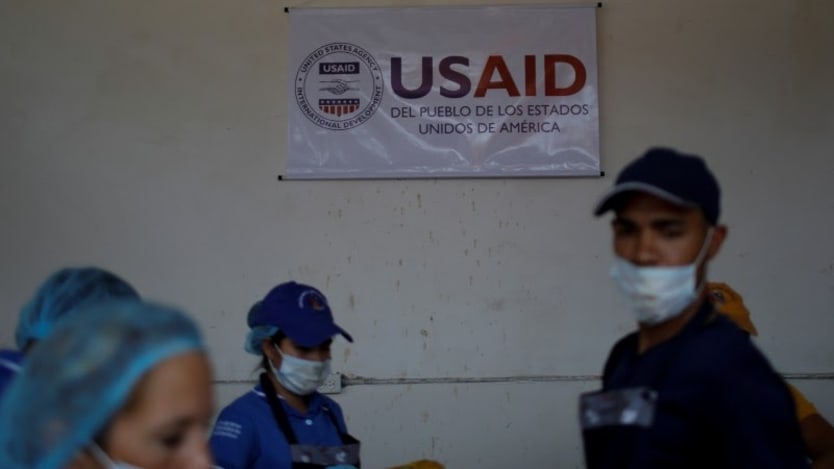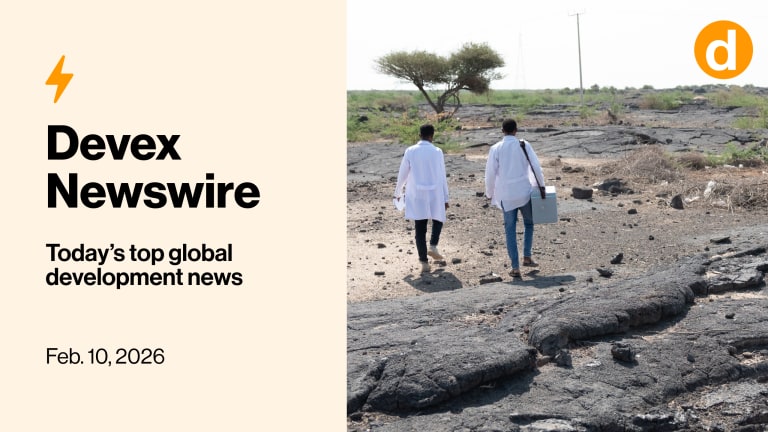Despite flexible USAID funding guidance, aid groups face long-term challenges

WASHINGTON — As COVID-19 disrupts the aid industry and sends organizations scrambling to respond, implementers for U.S. Agency for International Development programs are largely praising the agency’s communication and flexibility, even as they grapple with the potential long-term impacts of the crisis.
USAID has released several guidance documents, including a 31-page Q&A document last week, and has held numerous calls to help implementers navigate how to work with the agency as they need to change existing work plans or pause work on ongoing projects.
“[USAID] get it, they want us to be effective, and know what an incredible challenge this is.”
— Joel Charny, executive director, Norwegian Refugee Council USAThe common message from aid implementers is that they are trying to adapt to travel restrictions, contend with concerns about personal protective equipment shortages, and trying to sort out which of their programs can continue operating — some remotely, while some might have to pause. They’re also looking to see how some could be strengthened or adapted to address COVID-19.
USAID issues 'urgent request' for COVID-19 medical equipment
The agency did not confirm whether medical equipment identified by its implementing partners would be used in USAID's partner countries or inside the U.S.
One key flexibility that USAID is offering, though implementers do have to ask for it and it will be granted on a case-by-case basis, is the ability to do no-cost extensions on existing projects. USAID is also allowing projects, even those that have to pause operations, to continue to retain and pay staff.
The process for making changes to grants or contracts appears to be going pretty smoothly, but there are some concerns that over time, grant officers will struggle to keep up with the requests, said Jenny Marron, director of public policy and government affairs at InterAction. Eventually, more blanket guidance may be necessary on certain issues but Interaction is working with USAID on that, she said.
“So far sort of so good, except, you know, even the best intentions take time to percolate throughout agencies, so I think there's probably still hiccups here and there as everyone tries to work through the response,” Marron said.
Initially, USAID said that implementers could essentially assume they would get a no-cost extension, but that was revised to say that the agency would have to review each decision, said Joel Charny, executive director of Norwegian Refugee Council USA. The decision to walk things back a bit is understandable but “the initial reaction was incredible in a way, showing maximum flexibility,” he said.
Still, USAID is working with implementers and at least in the humanitarian sector is as flexible or more so than other major donors, Charny said.
“They get it, they want us to be effective, and know what an incredible challenge this is,” he said.
The response and communication from USAID differ from past experiences, such as during the 2018-2019 government shutdown, when there was “radio silence” for a long time, said Alan Chvotkin, executive vice president and counsel of the Professional Services Council.
Other agencies, including the President’s Emergency Plan for AIDS Relief, have issued some guidance, but there hasn’t been the same level of engagement as with USAID, according to PSC.
While the flexibility is important, so is the ability to rapidly deploy resources, said Margaret Schuler, World Vision’s senior vice president for programs.
“What’s critical in a crisis, especially one that moves so quickly, is how agile can we all be as a community,” Schuler said. USAID is doing its best to “pivot to the new reality” but it's important to find ways to scale the response quickly and avoid bulky hard-to-access mechanisms and potentially tedious procurement processes, she said.
In addition to announcing flexibilities in how it works with implementers, USAID has also signed off on some emergency procurement processes that will allow it to more easily increase funding to existing implementers through ongoing contracts or grants, and suspend some requirements as it allocates new funding during the emergency.
“We also do want to keep an eye on the priorities that existed before this which are still priorities.”
— Jenny Marron, director of public policy and government affairs, InterActionFunding from the COVID-19 supplemental funding bills does not seem to be flowing yet, but the fact that Congress has approved new funding for the response means that ongoing programs will be able to continue, and will prevent what Charny described as a need to triage where U.S. funds will go, at least for now.
COVID-19 — a timeline of the coronavirus outbreak
Follow the latest developments on the new coronavirus that causes COVID-19.
There will likely be delays to new non-COVID funding and projects from USAID as the agency prioritizes responding to COVID-19, but the extent to those delays is yet unclear. USAID has said that it has asked grant and contract officers to update deadlines to the USAID business forecast and advised implementers to watch for them.
Even as implementers make immediate adjustments, it is obvious that the crisis will have long-term implications on programs and business, but it’s still too early to assess what they will be, Chvotkin said.
There are also concerns for some implementers about their finances as operations slow, and also concerns that important programs could suffer or be left behind as the development focus narrows on COVID-19.
“We also do want to keep an eye on the priorities that existed before this which are still priorities,” Marron said. “We’re watching to make sure resources don’t get pulled in a way that is detrimental to existing priorities and programs.”
Since implementing organizations depend on performing program-related activities — including travel and organizing training and conferences, for example — to generate their revenue, they won’t have income they depend on. The longer the crisis lasts, the greater the economic impact on those organizations, said Patrick Fine, CEO at FHI360.
“I'm very concerned about the overall business position of a social enterprise like we run,” he said. “But to now, there's been a clear effort by funders to maintain the infrastructure and to help organizations cope with the disruption so that essential services can continue to be delivered through their programs.”
Michael Igoe contributed reporting to this article.
Visit our dedicated COVID-19 page for news, job opportunities, and funding insights.

Search for articles
Most Read
- 1
- 2
- 3
- 4
- 5








